Meet the heavenly hosts, from angels to archangels, and discover their roles in the divine tapestry that weaves through biblical history.
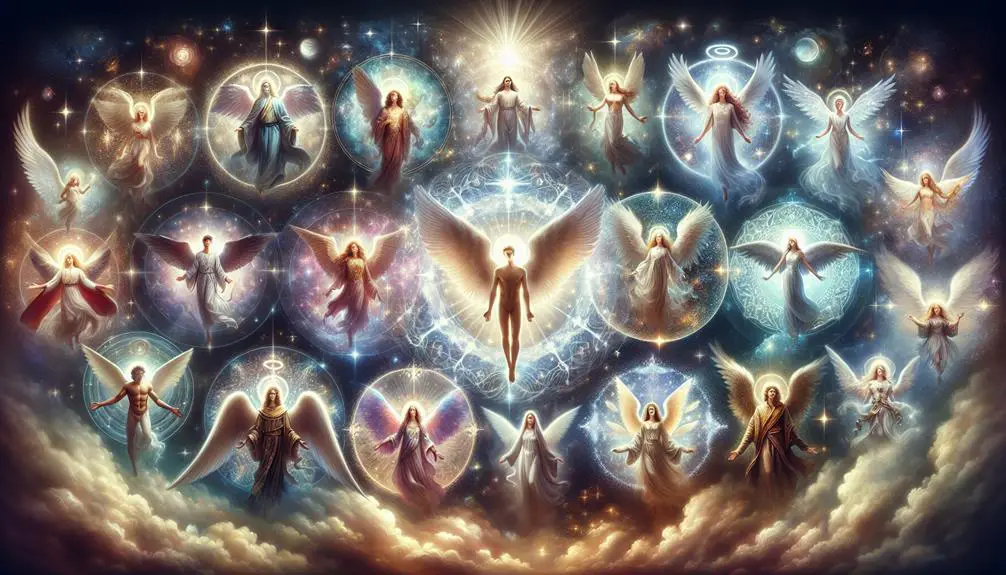
Who Are the Heavenly Hosts in the Bible
Navigating the celestial hierarchy in the Bible is like mapping the stars in the night sky—vast, complex, and full of wonder. You'll encounter angels, seraphim, cherubim, and archangels, each playing a distinct role in the divine narrative. These beings aren't just messengers; they're warriors, guardians, and ministers in a spiritual realm that influences the earthly one.
As you explore their stories and significance, you'll find that understanding the heavenly hosts isn't just about identifying who they are; it's about uncovering how their missions intertwine with human history and destiny. This journey promises to illuminate not just the pages of scripture, but the very fabric of faith itself.
Key Takeaways
- The heavenly hosts include angels, archangels, Seraphim, and Cherubim, each with distinct roles in the divine realm.
- Archangels serve as leaders, guiding other angels and delivering God's messages to humanity.
- Seraphim and Cherubim stand closest to God, symbolizing his supreme holiness and guarding his glory.
- The Divine Army, comprised of these celestial beings, protects the faithful and executes divine strategy.
Understanding Heavenly Hosts
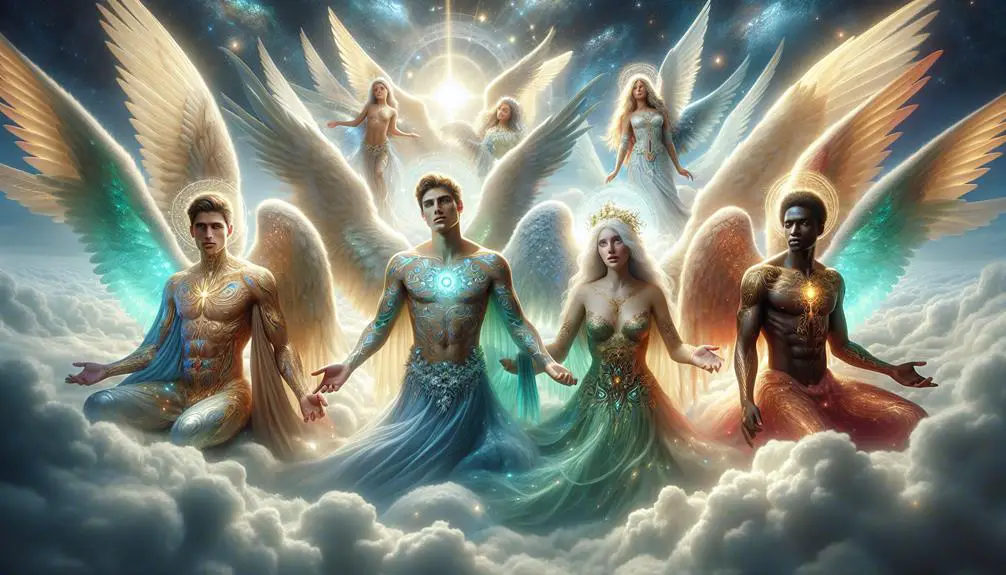
In the context of biblical scripture, 'heavenly hosts' refer to the myriad of celestial beings created by God to fulfill various roles within the divine realm. These entities, stemming from Divine origin, embody the celestial hierarchy that structures the heavens, marking a sophisticated order beyond human comprehension. You're exploring a realm where each being, from the highest seraphim to the most modest angel, serves a purpose under God's grand design, reflecting the Almighty's glory and power.
The concept of celestial hierarchy isn't merely a theological construct but a reflection of divine order and harmony. It's a system where chaos finds no foothold, where each member of the heavenly hosts plays a pivotal role in the cosmos's functioning. This hierarchy, deeply embedded in scripture, illustrates the meticulous care with which God fashioned the universe, assigning duties and positions with precision. It's a testament to the Creator's wisdom and foresight, ensuring that the heavenly realm operates seamlessly, according to divine will.
Understanding the heavenly hosts' Divine origin provides a profound insight into their nature and purpose. These beings, though varied in roles and ranks, share a common origin that binds them to their Creator. They're not just inhabitants of the heavenly realm but active participants in the divine plan, tasked with upholding the principles of order, goodness, and justice. This divine origin underscores their unwavering loyalty to God, marking them as eternal servants of the celestial hierarchy, dedicated to fulfilling their Creator's will throughout the universe.
Angels: Messengers and Warriors
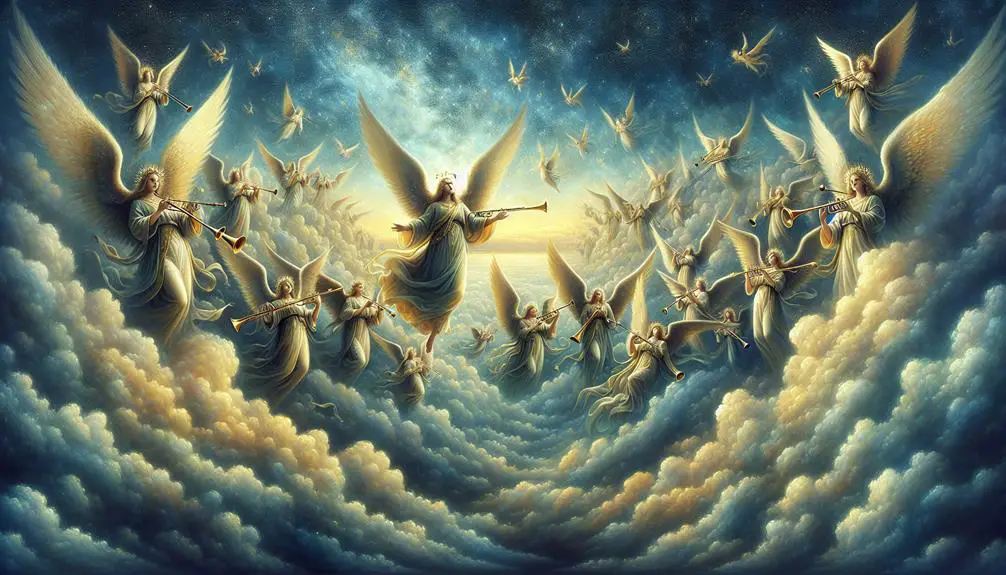
Among the heavenly hosts, angels stand out as both messengers of God's will and fierce warriors in the cosmic battle between good and evil. This dual role is deeply embedded in the biblical narrative, reflecting the complex nature of these celestial beings. The concept of an angelic hierarchy, with different orders or choirs, plays a pivotal role in understanding their celestial duties. At its core, this hierarchy reveals a well-organized structure, each level entrusted with specific responsibilities that serve the divine plan.
Angels, as messengers, are the bearers of God's word to humanity. They appear at critical moments in the biblical text, delivering messages that alter the course of human history. Their appearances aren't random but are a testament to their integral role in the divine order, acting under God's direction with unwavering obedience. This aspect of their duty emphasizes the importance of divine communication in the relationship between the divine and the earthly realm.
As warriors, angels exhibit God's power and justice. They're depicted as taking an active role in protecting the faithful and battling the forces of evil. This warrior aspect underscores the ongoing conflict between good and evil, with angels serving as God's soldiers. Their involvement in cosmic battles highlights the active presence of the divine in the world's affairs, ensuring that God's will prevails.
In essence, angels are multifaceted beings whose roles as messengers and warriors reflect their significant place within the divine order. Their existence and actions remind believers of the continuous interaction between the heavenly and the earthly, guiding humanity according to God's will.
Seraphim: The Burning Ones

Turning our focus to the Seraphim, we encounter celestial beings of profound mystery and awe, known as the 'Burning Ones' for their intense purity and closeness to God. These entities, deeply entrenched in seraphic lore, are often depicted with fiery symbolism that speaks to their role as purifiers and worshippers within the heavenly hierarchy. Their existence isn't merely a testament to the multifaceted nature of divine messengers but also an invitation to ponder the depths of their devotion and the intensity of their love for the Creator.
In the narrative of seraphic beings, several aspects stand out, designed to evoke emotion and reflection:
- Their fiery nature symbolizes an unquenchable zeal for serving and glorifying God.
- Seraphim's presence around the throne of God signifies their supreme holiness and direct service to the Divine.
- The imagery of Seraphim with six wings, as detailed in scripture, underscores their readiness and swiftness to obey God's commands.
- Their role in celestial worship, continuously singing praises, highlights the perpetual adoration due to God.
- The purification of the prophet Isaiah by a Seraphim, using a coal from the altar, illustrates their part in preparing humans for divine encounters and missions.
These elements, steeped in seraphic lore and fiery symbolism, not only enrich our understanding of these heavenly beings but also serve as a mirror reflecting our own spiritual aspirations towards purity, devotion, and service to the Divine. By contemplating the Seraphim, we're invited into a deeper relationship with the mysteries of faith and the infinite love of God.
Cherubim: Guardians of Glory
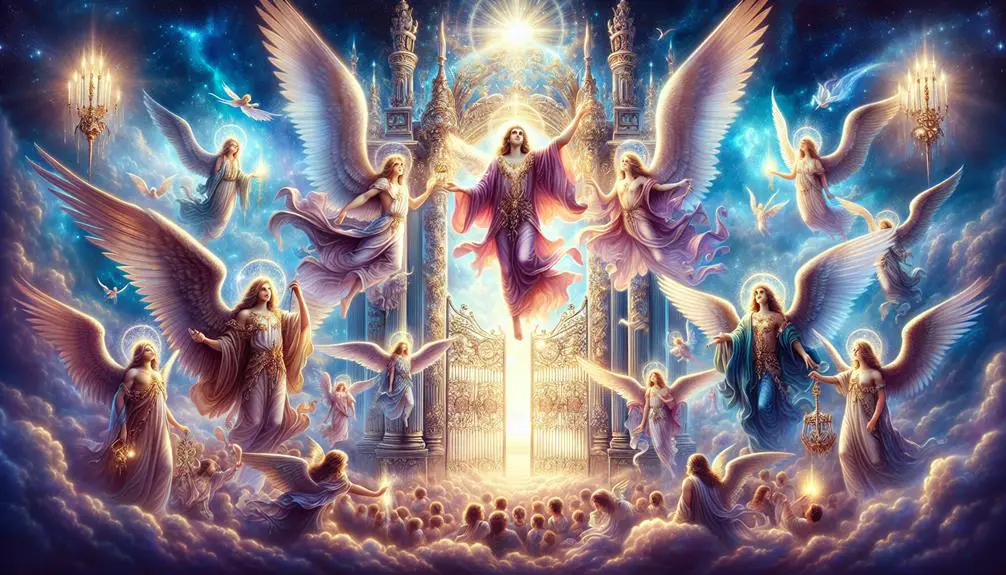
Shifting our gaze to the Cherubim, we find ourselves before the guardians of divine glory, whose presence throughout scripture underscores their pivotal role in the celestial hierarchy. The Cherubim's symbolism is deeply embedded in biblical lore, representing not merely creatures of beauty but formidable protectors of the sacred. Their depiction at the Garden of Eden's entrance, wielding a flaming sword to guard the way to the Tree of Life, illustrates their function as divine sentinels.
Artistic interpretations of Cherubim have varied widely across cultures and epochs, yet a common thread persists: they're portrayed with features that signify their transcendence and power. Typically, these celestial beings are depicted with multiple faces, wings, and often in close proximity to the throne of God, highlighting their status among the heavenly hosts. This imagery serves to remind the faithful of the Cherubim's role in upholding the sanctity and majesty of the divine presence.
Theological discourse on Cherubim further amplifies their significance. They're often seen as embodying the knowledge and glory of God, acting as intermediaries between the divine and the earthly realm. Their placement in the Holy of Holies, atop the Ark of the Covenant, signifies their integral role in the divine economy, symbolizing God's immanence and transcendence.
In delving into the rich tapestry of Cherubim symbolism and their artistic renditions, one gains a profound appreciation for these guardians of glory. Their depiction across scripture and sacred art invites contemplation on the mysteries of the divine, reinforcing their enduring legacy in the annals of faith.
Archangels: Leaders in the Celestial Realm
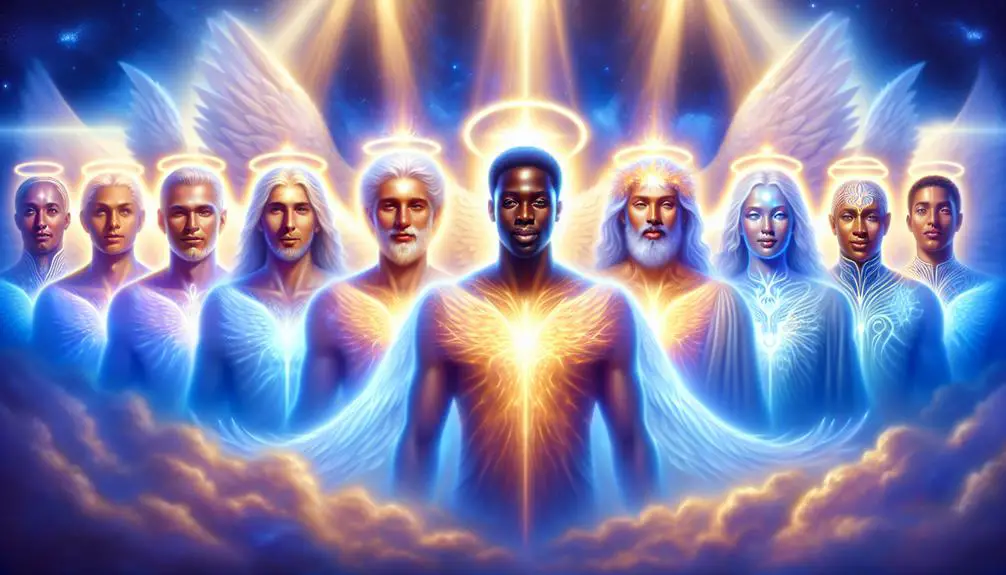
Exploring further into the hierarchy of celestial beings, we now encounter the Archangels, recognized as the formidable leaders within the celestial realm. These beings, shrouded in mystery and awe, serve as the direct messengers and warriors of the divine, standing at the pinnacle of the celestial hierarchy. Their origins, deeply rooted in sacred texts, provide a glimpse into the structured and ordered nature of the cosmos as envisioned by various faith traditions.
The Archangels, each with unique roles and responsibilities, are revered for their strength, wisdom, and unwavering loyalty to the divine will. They're the bridge between the earthly and the heavenly, executing missions of critical importance across the expanse of creation.
- Michael: Often depicted wielding a sword, symbolizes protection and justice.
- Gabriel: The messenger, evokes feelings of revelation and divine announcement.
- Raphael: Associated with healing, brings hope and restoration.
- Uriel: Represents wisdom, guiding souls towards enlightenment.
- Saraqael: Invoked for forgiveness, embodies the mercy of the divine.
Their existence and deeds resonate deeply within the human soul, stirring emotions ranging from awe to comfort. The Archangel origins, deeply intertwined with the fabric of religious narrative, underscore the complexity and grandeur of the celestial hierarchy. In understanding these leaders of the celestial realm, one gains insight into the divine order and the pivotal role these beings play in the cosmic narrative. Their stories, transcending mere mythology, invite reflection on the nature of divine interaction with the world.
The Divine Army: Warfare and Protection
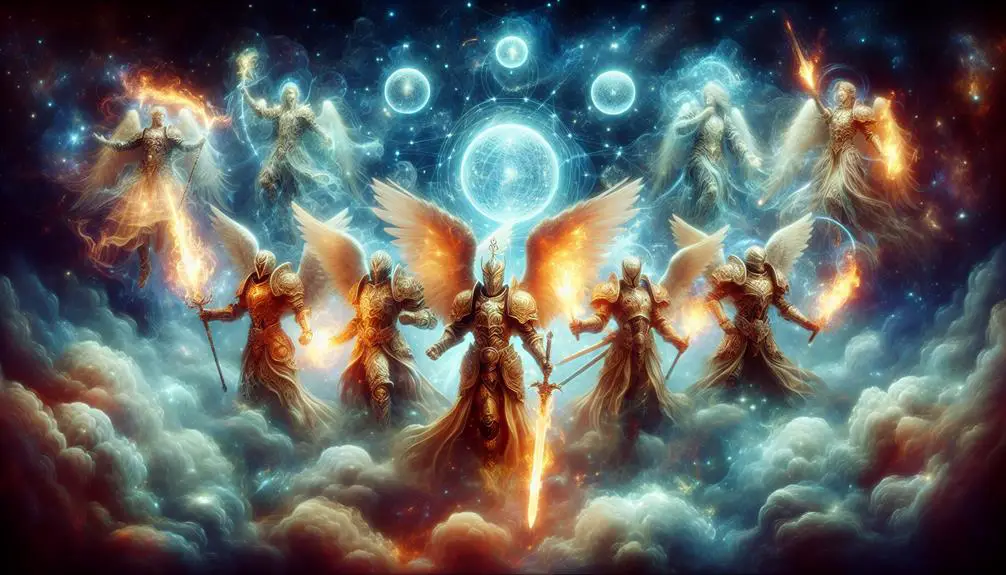
Within the grand narrative of celestial beings, the concept of a Divine Army underscores the thematic elements of warfare and protection, pivotal in understanding the dynamics of spiritual conflicts. This Divine Army, composed of heavenly hosts, operates under a Divine strategy that's both intricate and profound. It's not just about battles fought in the spiritual realm; it's about the protection afforded to the faithful through these celestial tactics.
You'll find that the Bible portrays this army as God's instrument of justice and defense, executing Divine strategy with precision and unwavering faith. The celestial tactics employed by this army aren't random acts of force but calculated moves designed to protect, guide, and sometimes, to deliver God's judgment.
The concept of warfare in the spiritual realm might seem distant, yet it's intricately linked to the moral and ethical struggles faced by individuals daily. The Divine Army's role in this cosmic battle underscores the belief in a protective force that stands against the powers of darkness. This isn't just about mythic battles; it's an affirmation of the ongoing struggle between good and evil, with celestial beings acting on behalf of humanity.
Understanding the role and function of the Divine Army brings to light the depth of God's commitment to the protection and guidance of His creation. It reveals a layer of Divine strategy that encompasses not just the immediate, but the eternal welfare of the soul. Through celestial tactics, this divine army exemplifies God's overarching plan for cosmic harmony and individual safety.
Ministering Spirits: Service and Guidance
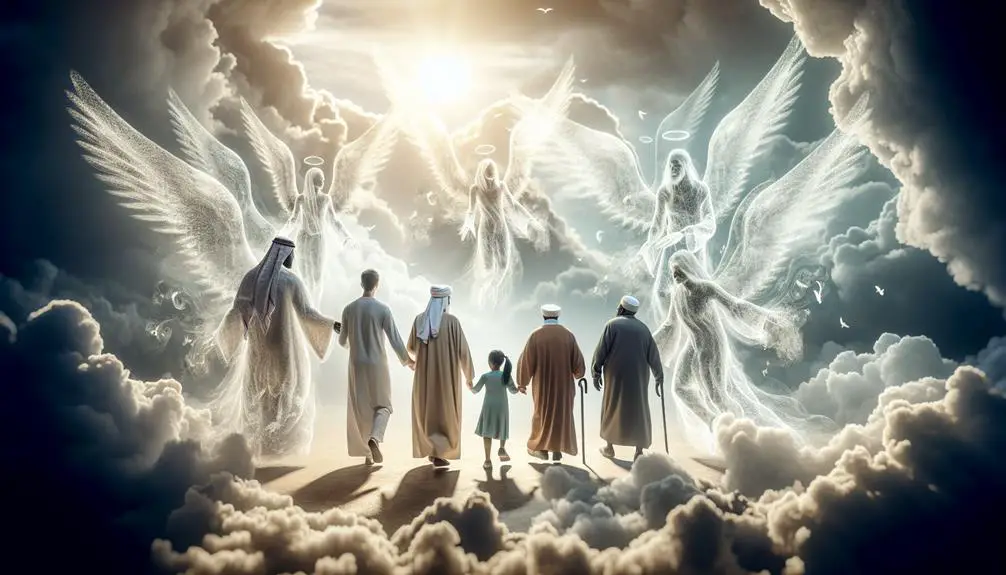
You'll find that the Bible richly documents the roles of angels as ministering spirits who offer both guidance and spiritual support.
These celestial beings serve as God's messengers, providing direction and comfort to humans in times of need.
Their service is a testament to God's care and the intricate ways He interacts with His creation.
Angels' Guiding Roles
Angels, as divinely appointed ministers, play a pivotal role in guiding and serving humanity in accordance with God's will. Through angelic appearances and celestial guidance, they illuminate paths not just for the chosen but for anyone seeking direction. Their presence underscores a profound connection between the divine and the earthly realms, offering insights and interventions that are both mysterious and deeply personal.
- Angelic visits bring solace during moments of uncertainty.
- Celestial guidance often arrives when you're at a crossroads, unsure of which path to take.
- The silent whispers of angels can turn despair into hope.
- Their unseen presence provides a comforting reassurance of divine oversight.
- Encounters with these celestial beings inspire awe, revitalizing faith in the unseen.
Spiritual Support Duties
In the realm of spiritual support, ministering spirits serve as divine intermediaries, offering guidance and assistance to those navigating life's challenges. These beings, integral to the heavenly hierarchy, perform celestial tasks designed to provide both spiritual and moral support to humanity. Their roles are multifaceted, encompassing protection, inspiration, and the conveyance of divine messages.
Role |
Function |
Scriptural Reference |
|---|---|---|
Guardian |
Protect and guide individuals |
Psalms 91:11 |
Messenger |
Deliver divine messages |
Luke 1:19 |
Worship Leader |
Lead heavenly worship |
Revelation 5:11-12 |
Intercessor |
Intercede on behalf of humans |
Job 33:23-24 |
Teacher |
Provide wisdom and understanding |
Daniel 9:22 |
This celestial framework underscores the depth of the spiritual support system designed for humanity's benefit, reflecting a profound connection between the divine and the mortal.
The Role of Heavenly Hosts in Revelations
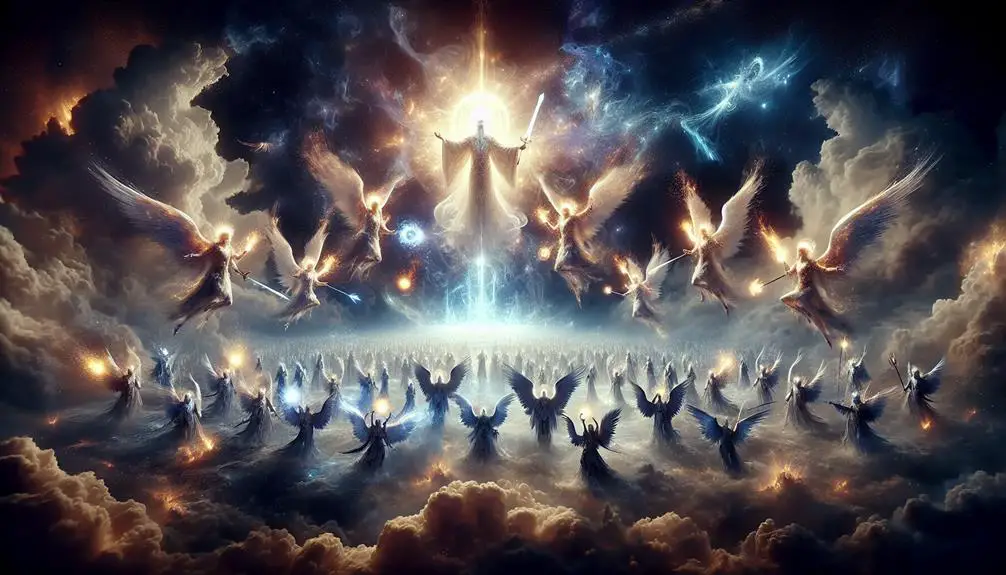
Often, the heavenly hosts play a pivotal role in Revelation, serving as executors of divine judgment and messengers of God's will. In this climactic book of the Bible, they're deeply intertwined with end times symbolism and apocalyptic visions, vividly depicting the culmination of God's plan for creation. As you delve into the apocalyptic literature, you encounter a complex array of images and symbols, each carrying profound theological implications.
The heavenly hosts are central to the unfolding drama, executing judgments with precision and acting as heralds of the impending divine kingdom. Their actions underscore the majesty and holiness of God, reminding you of the seriousness with which He approaches the redemption and judgment of the world.
- Awe-inspiring might: You're reminded of the power that operates at God's command, capable of altering the course of history.
- Divine justice: Their actions serve as a testament to God's unwavering commitment to justice.
- Mercy and warning: Even in judgment, the role of heavenly hosts in conveying warnings speaks to God's mercy.
- Symbolic complexity: They embody the rich tapestry of symbols that define apocalyptic literature.
- Eternal hope: Through their presence, you're offered a glimpse into the eternal hope that lies beyond the present turmoil.
In analyzing their role, you gain not only insights into the nature of divine judgment and redemption but also a deeper understanding of the spiritual realm that influences human history. The heavenly hosts in Revelation serve as a powerful reminder of the cosmic battle between good and evil, ultimately pointing to God's sovereign rule over all creation.
Frequently Asked Questions
How Have Artistic Representations of the Heavenly Hosts Evolved Throughout History, Especially in Different Cultural Contexts?
Artistic representations of heavenly beings have evolved significantly, especially when you consider different cultural contexts. From the intricate Renaissance symbolism imbued with deep theological meanings to the instances of cultural appropriation, where elements from various traditions are blended, these portrayals reflect both changing artistic styles and shifts in religious understanding.
As you delve into these depictions, you'll notice how artists have historically grappled with the divine, translating complex spiritual concepts into visual form.
What Are the Major Theological Differences in the Interpretation of Heavenly Hosts Among Various Christian Denominations and Other Abrahamic Religions?
You'll find that the interpretation of the angelic hierarchy varies significantly among Christian denominations and other Abrahamic religions. These differences aren't just academic; they shape the faith and practice of millions.
Through interfaith dialogues, scholars and believers explore these theological distinctions, seeking understanding and common ground.
Whether it's the roles of seraphim and cherubim or the number of angelic orders, each tradition offers a unique perspective on the heavenly hosts.
Can the Concept of Heavenly Hosts Be Found in Religious Texts Outside of the Bible, and How Do These Interpretations Compare?
Diving into the ocean of sacred texts, you'll find that the concept of heavenly hosts isn't confined to the Bible.
These celestial entities, often seen as mythological parallels or cosmological symbols, appear across various religious traditions.
Comparing these interpretations, you'll notice a rich tapestry of belief and symbolism, highlighting a universal human fascination with the divine.
This exploration reveals a scholarly, faith-based understanding of how different cultures envision the celestial realm.
How Has the Perception of the Heavenly Hosts Influenced Modern Spiritual Practices and New Age Beliefs?
You'll find that the perception of the heavenly hosts has deeply influenced modern spiritual practices and new age beliefs. Through angelic communication, many seek guidance and wisdom, embedding these interactions into spiritual rituals.
This evolution reflects a blend of traditional faith-based perspectives with contemporary spiritual explorations. As you delve deeper, you'll notice how this synthesis shapes practices, highlighting the enduring impact of these celestial beings on spiritual growth and understanding.
What Role Do the Heavenly Hosts Play in Contemporary Media and Fiction, and How Has This Portrayal Impacted Popular Understanding of These Celestial Beings?
In contemporary media and fiction, particularly in video games and science fiction, heavenly hosts often play diverse roles, from guardians to antagonists. This portrayal significantly influences your understanding of these celestial beings, merging traditional perceptions with modern narratives.
Through these mediums, you're introduced to a blend of faith-based concepts and speculative storytelling, reshaping how heavenly hosts are viewed, and integrating these ancient figures into the fabric of modern cultural and spiritual consciousness.
Conclusion
In the grand tapestry of biblical narrative, heavenly hosts stand as both warriors in celestial combat and messengers of divine will, embodying a paradox that captivates and confounds. These beings, from the awe-inspiring seraphim to the stalwart archangels, navigate the cosmos with a singular purpose: to enact God's commands.
Their roles juxtapose the might of divine warriors with the gentleness of guiding spirits, illustrating a multifaceted divine strategy that's both scholarly and faith-filled, urging us to look beyond our understanding.

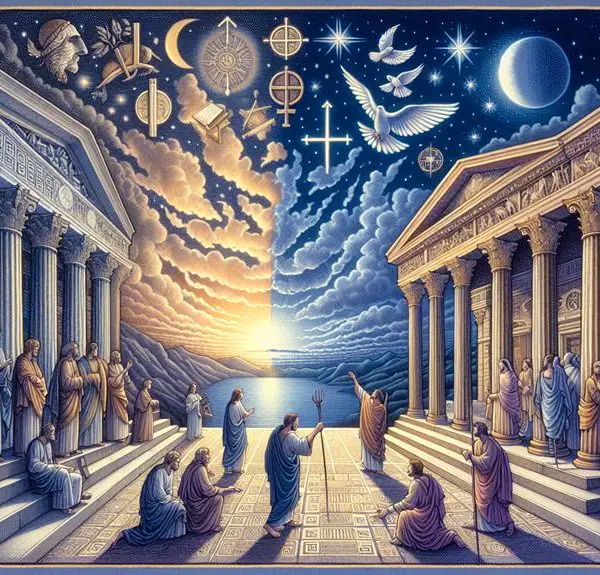

Sign up